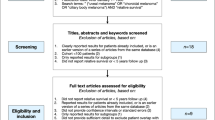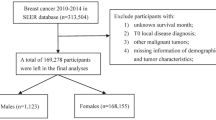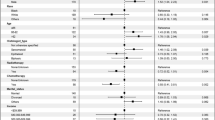Abstract
Survival data of 106 males and 110 females with disseminated malignant melanoma, recorded between 1956 and 1975, were reviewed. Survival after first evidence of distant metastasis was significantly longer in women than in men (P = 0.02). There was no difference in survival after occurrence of distant metastasis between pre- and postmenopausal women, nor between parous and nulliparous women. However, there was a clear female superiority of premenopausal women over males less than or equal to 50 years and, to a lesser extent, of postmenopausal women over males > 50 years. It is concluded that endocrine factors enhance melanoma activity in the male patient. The suggestion that malignant melanoma is "testosterone-dependent" seems justifiable. A possible explanation is given for the general experience that women with melanoma show a more favourable response to chemotherapy than men.
This is a preview of subscription content, access via your institution
Access options
Subscribe to this journal
Receive 24 print issues and online access
$259.00 per year
only $10.79 per issue
Buy this article
- Purchase on Springer Link
- Instant access to full article PDF
Prices may be subject to local taxes which are calculated during checkout
Similar content being viewed by others
Rights and permissions
About this article
Cite this article
Rampen, F. Malignant melanoma: sex differences in survival after evidence of distant metastasis. Br J Cancer 42, 52–57 (1980). https://doi.org/10.1038/bjc.1980.202
Issue Date:
DOI: https://doi.org/10.1038/bjc.1980.202
This article is cited by
-
Sex differences in cancer mechanisms
Biology of Sex Differences (2020)
-
Prognostic significance of the patient's sex, tumor site, and mitotic rate in thin (?1.5 mm) melanoma
Archives of Dermatological Research (1984)
-
Comments on the contribution by H. J. Grill et al.
Archives of Dermatological Research (1983)



